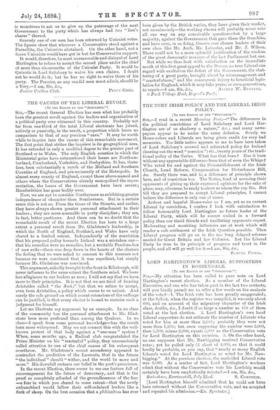THE CAUSES OF THE LIBERAL REVOLT.
[To THE EDITOR OF THE " SPECTATOR."'
'SIR,—The recent General Election has seen what has probably been the greatest revolt against the leaders and organisation of a political party ever witnessed in this country. Probably not far from one-third of the total Liberal electorate has joined, actively or passively, in the revolt, a proportion which bears no comparison to that of any previous " cave." It may be worth while to inquire into the causes of this remarkable movement. The first point that strikes the inquirer is its geographical area. It has extended in only a modified degree to the greater part of Scotland or to Wales. The only English counties in which the Ministerial gains have outnumbered their losses are Northum- berland, Cumberland, Yorkshire, and Derbyshire. It has, there- fore, been substantially a revolt of the Midland and Southern Counties of England, and pre-eminently of the Metropolis. In almost every county of England, except those above-named and others where the Conservatives already monopolised the repre- sentation, the losses of the Government have been severe ; Herefordshire has gone bodily over.
Now, we are apt to consider Northerners as exhibiting greater independence of character than Southerners. But in a certain sense this is not so. From the times of the Stuarts, and earlier, they have always shown greater personal attachment to their leaders ; they are more amenable to party discipline; they are, in fact, better partisans. And there can be no doubt that the remarkable result of the recent Election has been to a large extent a personal revolt from Mr. Gladstone's leadership, in which the North of England, Scotland, and Wales have only shared to a limited extent. Independently of the conviction that his proposed policy towards Ireland was a mistaken one— that his remedies were no remedies, but a veritable Pandora-box • of new evils—there was deep down in the hearts of the electors the feeling that we were asked to consent to this measure not because we were convinced that it was expedient, but simply because Mr. Gladstone was convinced.
This argument, nakedly brought to the front in Edinburgh, will never influence to the same extent the Southern mind. We have less allegiance to our leaders as men ; I will not say that we have more to their principles. It is not that we are tired of bearing Aristeides called " the Just;" but that we refuse to accept, even from Aristeides, a policy which seems to us unjust. And surely the sole ground on which recent extensions of the suffrage can be justified, is that every elector is bound to exercise such a judgment for himself.
Let me illustrate my argument by an example. In no class of the community has the personal attachment to Mr. Glad- stone been more profound than among the Quakers. In no class—I speak from some personal knowledge—has the revolt been more widespread. May we not connect this with the well- known protest of that body against a " one-man " system ? When, some months ago, a Radical club congratulated the Prime Minister on his "masterful" policy, they unconsciously called attention to one of the chief causes of his subsequent overthrow. Mr. Gladstone's recent ascendency appeared to contradict the prediction of the Laureate, that in the future 'the individual " should " wither, and the world be more and more." His downfall restores our belief in the poet's prescience.
In the recent Election, there seems to me one feature full of encouragement for the future of democracy,. and that is the proof so completely afforded of the groundlessness of the fear —a fear in which you shared to some extent—that the newly enfranchised would follow their self-ordained leaders like a flock of sheep. On the first occasion that a plebiscituna has ever been given by the British nation, they have given their verdict, not unanimously—the working classes will probably never vote all one way on any conceivable question—but by a large majority, against the Government that gave them the franchise, and have even, in so doing, thrown over chosen leaders of their own class like Mr. Arch, Mr. Leicester, and Mr. J. Wilson. There could not be a more splendid justification of the wisdom of the great democratic measure of the last Parliamentbut one.
But while we thus look with satisfaction on the immediate result of this first great appeal to the Demos, no true Liberal can regard with exultation the defeat of the Government, the shat- tering of a great party, brought about by mismanagement and " masterfulness," and the consequent- injury to beneficial legis- lation for England, which it may take years, or even generations,


































 Previous page
Previous page